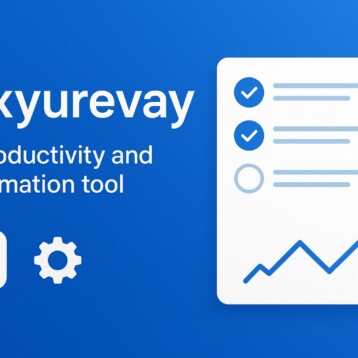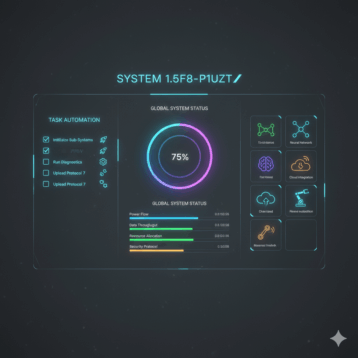Any academic work requires special attention. Essays, reports, and book reviews are more or less manageable even when you try to complete them for the first time. As you climb your education ladder, gradually, the importance of every academic assignment also grows.
Dissertations are known for their great value as you get a Ph.D. degree eventually. Yet, they are known for one more thing: it’s impossible to craft one final version that would satisfy the university. So, you may have a dozen files just because the professor won’t accept your referencing or usage of some terms.
One of the ways to simplify the process is the same as when you order essay editing for other tasks. But what can you do yourself? Check out the resources below to find how you can organize and simplify your dissertation writing process.
Taskade
This one is useful in general for complicated projects. Anyway, let’s focus on how you can apply it to your Ph.D. academic writing. First of all, whatever you research and write as a student, there will always be stages that should be completed according to a strict set of criteria. Using Taskade, you can create several lists for the stages of your research:
- reading:
- databases;
- library;
- recommendations from the supervisor;
- guidelines from the university;
- drafting Literature Review:
- topics;
- contradicting opinions;
- gaps in research;
- preparing the research itself:
- draft a consent form, an invitation letter, and a questionnaire;
- wait for approval from the university;
- primary research:
- sample the participants;
- send them the documentation;
- collect at least 80 responses;
- compile raw data.
You got the gist. The whole research process can be broken down into stages and adhered to bit by bit. The thing is, when you don’t see what you need to do at all or, vice versa, see an endless list of to-dos, procrastination is likely to creep up behind and embrace you. The long list will just turn you off as you won’t know where to start from.

Such a thing as Taskade helps to tackle the chunks of the project one by one and not mess up or mix the criteria for each chapter/stage/process. The website has a user-friendly interface and is easy to navigate. It has a browser extension available as well.
Research-Methodology (.net) or BRM
This exceptional resource covering all the basic aspects of methodology is exactly what a fresh researcher needs. Even if you’re not familiar with some notions at all, you don’t need to drudge at numerous editions of books about methods. All the information you’re going to need at the beginning is collected here.
The website offers you short definitions and readable compilations in the form of tables. The latter often provides you with information about the compatibleness of methods, types of analysis, etc.
Just remember that it’s not a source you can rephrase to write your Methodology chapter. First of all, universities use advanced plagiarism tools that can be accessed only by professors. So, you’re gonna be caught anyway. Second, Methodology is not a place to define what research philosophy is (unless you are directly instructed to do so).
ResearchGate
If you have further questions after visiting the site above, you can use ResearchGate. Make sure you pose a clear question. It’s also better to include an example if you have one. You can inquire about any details you need to know about the research process.
A string of debates is often inevitable, yet, truth is born of arguments. Moreover, the debates are usually held by other researchers. So, it’s not a simple forum you can trust only as a last resort.
Besides, the website offers you the option to browse for publications and details about particular researchers. One of the most useful features is the filtering for publications according to the subject area.
CitationMachine (.net)
This one works perfectly for those who have no time to put every comma in the referencing list or change the order of first names and surnames to craft a perfect MLA. Referencing styles sometimes give students harder times than actually writing a dissertation. It is especially tiresome if your supervisor is a thorough person.
Dissertations require at least 30 sources, at best. If you track the sources you include in your work from the very beginning, it’s a good start. Using automatic referencing tools from different websites where you find your publications also simplifies the process. Yet, later, it may lead to a mess. Why?
Some websites offer citations and references in APA and MLA, others – in Vancouver and a nobody-knows-what-that-is style. So, sooner or later, you’re going to need to align each and every entry of your bibliography. The CitationMachine is a perfect engine for this purpose, it supports a myriad of referencing styles and can find the source by its name or author(s).

ReciteWorks (.com)
It would be a lie to say that this source is perfect. It supports only APA6th, APA7th, and Harvard. Yet, those are used in the majority of dissertations. The main perk of ReciteWorks is that using it, you can forget about manually searching for citations with typos or checking all sources.
This website counter checks the reference list and citations and shows warnings in case:
- the cited source is absent from the referencing list;
- there is a typo in a surname;
- the source from the reference list wasn’t used in the text;
- the syntax of the entry doesn’t conform to the chosen style (this aspect doesn’t work perfectly yet).
You can upload a full file or paste the text. Just make sure that the reference list is titled ‘References’ so that the software recognizes where the list starts. Despite the demerits, the website constantly improves its functionality. Its current main function is to let you focus on several references with mistakes instead of going through each line of your Ph.D. work.
Conclusion
Using these five resources, students can significantly simplify their writing process. Whether you need a recommendation, guidelines, or a tool for managing minor things that take a lot of time, go through this list. It may save you a lot of precious time.










